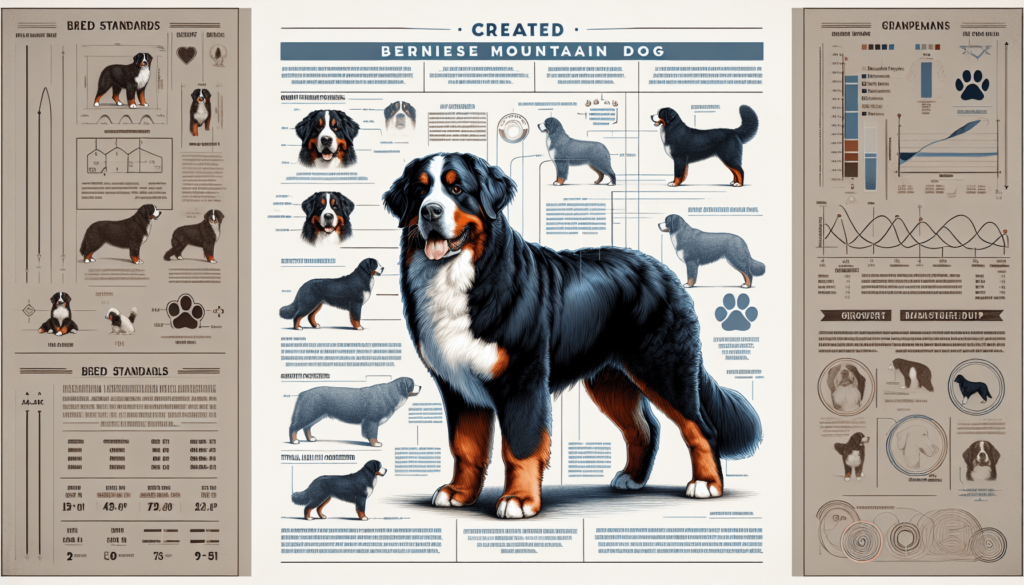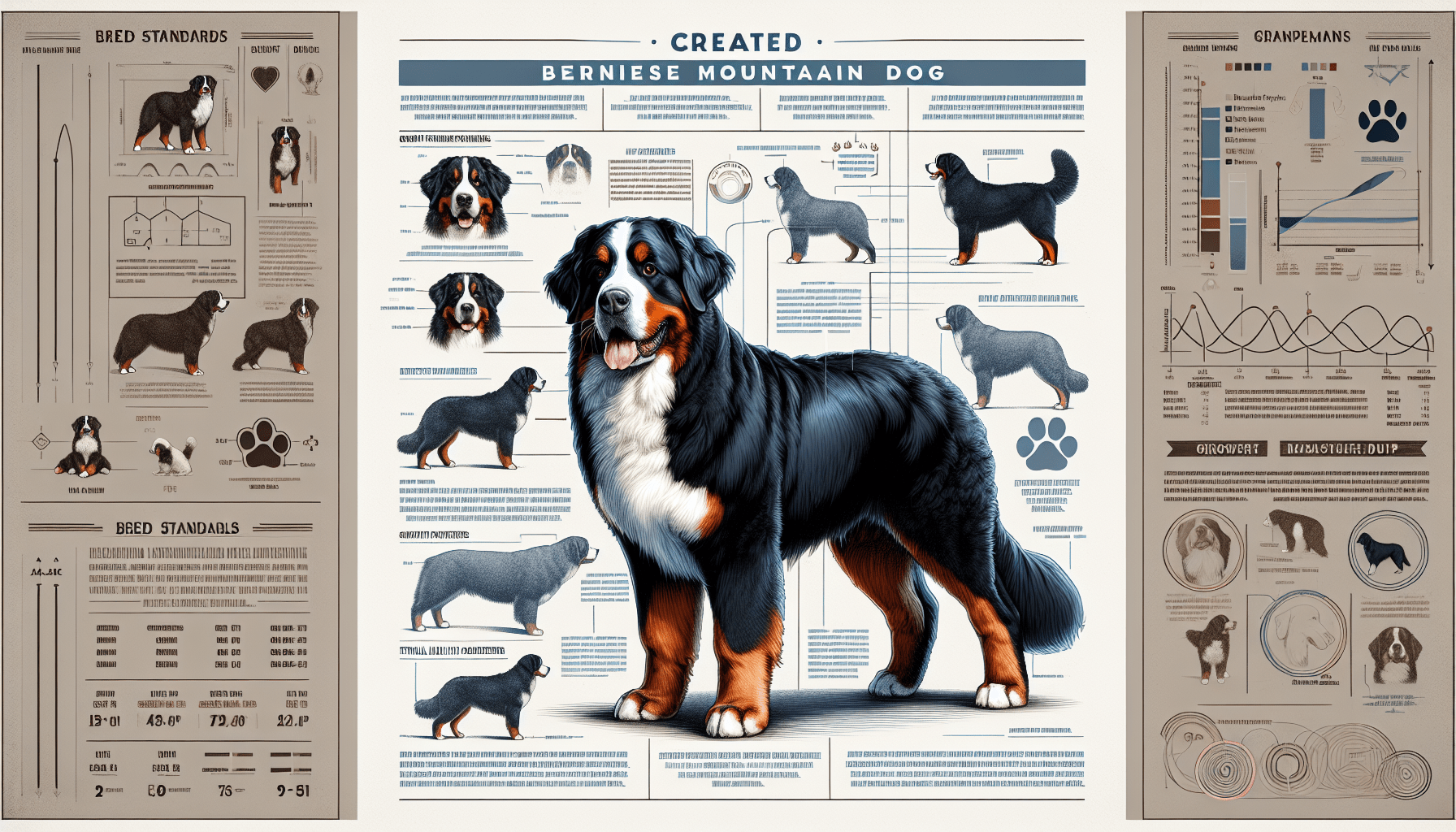Have you ever wondered just how big and heavy Bernese Mountain Dogs can get? In this article, we’ll explore the fascinating world of Bernese Mountain Dogs and shed some light on their size and weight. These majestic and gentle giants are beloved for their stunning appearance and kind nature. So, let’s dive right in and uncover everything you need to know about the size and weight of Bernese Mountain Dogs!

Appearance
Coat
The Bernese Mountain Dog is known for its beautiful and thick double coat. Their coat is long, soft, and shiny, providing protection against harsh weather conditions. The outer coat is slightly wavy and the undercoat is dense, providing insulation. The coat is one of the prominent features of the breed, making them look even more majestic.
Color
One of the distinguishing characteristics of the Bernese Mountain Dog is its tri-color markings. Their coat is primarily black with rust-colored markings on their face, chest, and legs, as well as a white blaze on the chest and white feet. The combination of black, rust, and white creates a stunning contrast that adds to their overall charm and appeal.
Build
Bernese Mountain Dogs have a sturdy and muscular build, which is essential for their original purpose as working dogs. They have a deep chest and a strong, broad back. Their body is well-balanced and compact, giving them a powerful appearance. Despite their robust build, they are still incredibly graceful and agile.
Height
Ideal Height
The ideal height for a male Bernese Mountain Dog is between 25 to 27.5 inches (63 to 70 cm) at the shoulder, while females have an ideal height of 23 to 26 inches (58 to 66 cm). It is important to note that these are general guidelines, and some individual dogs may fall slightly outside this range while still maintaining a healthy and desirable physique.
Standard Height
The breed standard for the Bernese Mountain Dog sets the minimum height for males at 24 inches (61 cm) and for females at 22 inches (56 cm). The maximum allowed height is 28 inches (71 cm) for males and 27 inches (69 cm) for females. Dogs that fall within this standard height range are considered to have the proper proportions and structure for the breed.
Measuring Height
To measure the height of your Bernese Mountain Dog, place them in a standing position on a level surface with their front feet straight ahead. Using a measuring tape or a ruler, carefully measure from the ground to the highest point of their shoulder blades. It is important to measure accurately to assess their height correctly.
Weight
Ideal Weight
The ideal weight for a male Bernese Mountain Dog is between 80 to 115 pounds (36 to 52 kg), while females have an ideal weight of 70 to 95 pounds (32 to 43 kg). These weight ranges are considered healthy and appropriate for the breed, ensuring that the dogs are well-muscled and maintain their agility.
Standard Weight
The breed standard for the Bernese Mountain Dog sets the minimum weight for males at 90 pounds (41 kg) and for females at 80 pounds (36 kg). The maximum allowed weight is 120 pounds (54 kg) for males and 105 pounds (48 kg) for females. Dogs that fall within this weight range are considered to have the proper body condition and overall health.
Factors Affecting Weight
Several factors can influence the weight of a Bernese Mountain Dog. Genetics play a significant role, as dogs from larger parents are more likely to be heavier. Nutrition and feeding habits also impact weight, as overfeeding can lead to obesity. Additionally, exercise levels and overall health can affect weight, so it is crucial to provide a balanced lifestyle for your Bernese Mountain Dog.
Size and Weight Comparison
Comparing to Other Breeds
When comparing the size and weight of Bernese Mountain Dogs to other breeds, they are considered to be large dogs. They are similar in size to other working breeds such as the Greater Swiss Mountain Dog and the Newfoundland. However, they tend to be more compact and have a heavier build compared to breeds like the Great Dane.
Growth Rate
Bernese Mountain Dogs have a moderate growth rate compared to some other large breeds. They typically reach their full height by around 18 months, but it can take up to 2 years for them to fully develop and fill out their frame. It is essential to provide proper nutrition and exercise during their growth stages to ensure healthy bone and muscle development.

Development Stages
Puppy Stage
The puppy stage is a crucial time for Bernese Mountain Dogs as they develop their size, strength, and personality. During this stage, they grow rapidly and require proper nutrition, socialization, and training. It is important to provide a safe and stimulating environment for the puppies to explore and grow into well-rounded dogs.
Adolescent Stage
The adolescent stage marks a period of growth and maturation for Bernese Mountain Dogs. This stage typically starts around 6 to 12 months of age and lasts until they reach adulthood. It is during this stage that they may experience growth spurts and may need adjustments in their diet and exercise routine to support their development.
Adult Stage
Bernese Mountain Dogs reach adulthood at around 2 years of age. At this stage, they have reached their full size and weight, and their skeletal structure is fully developed. Adult Bernese Mountain Dogs require regular exercise, a balanced diet, and ongoing care to maintain their health and overall well-being.
Average Size and Weight
Size Range
The size range for adult Bernese Mountain Dogs is typically between 23 to 27.5 inches (58 to 70 cm) at the shoulder. However, individual dogs may fall slightly outside this range while still maintaining good health and meeting the breed standards.
Weight Range
The weight range for adult Bernese Mountain Dogs is typically between 70 to 120 pounds (32 to 54 kg). As with the size range, there can be some variations in weight within this range depending on factors such as genetics, sex, and overall health.
Sex Differences
Males tend to be slightly larger and heavier compared to females in the Bernese Mountain Dog breed. On average, male Bernese Mountain Dogs weigh between 80 to 115 pounds (36 to 52 kg), while females weigh between 70 to 95 pounds (32 to 43 kg). These differences in size and weight are generally due to sexual dimorphism and hormonal factors.
Health Considerations
Joint Issues
Bernese Mountain Dogs can be prone to certain joint issues such as hip dysplasia and elbow dysplasia. These conditions occur when the joints do not develop properly, leading to discomfort, pain, and mobility issues. Regular exercise, a balanced diet, and weight management are crucial in minimizing the risk of joint problems in this breed.
Obesity Risks
Due to their large size and propensity to overeat, Bernese Mountain Dogs are at risk of obesity. Obesity can lead to various health problems, including joint issues, heart disease, and a shortened lifespan. It is essential to monitor their food intake, provide regular exercise, and seek veterinary guidance on maintaining a healthy weight for your Bernese Mountain Dog.
Feeding Requirements
Dietary Needs
Bernese Mountain Dogs have specific dietary needs to support their growth, energy, and overall health. A high-quality dog food that is formulated for large breeds is recommended. The food should contain a proper balance of protein, fats, carbohydrates, vitamins, and minerals. It is important to consult with a veterinarian to determine the most suitable diet for your Bernese Mountain Dog.
Portion Sizes
Portion sizes for Bernese Mountain Dogs can vary based on factors such as age, weight, activity level, and metabolism. It is important to feed them an appropriate amount of food to maintain a healthy weight and prevent obesity. Overfeeding can lead to excessive weight gain and potential health problems. Monitoring portion sizes and feeding schedules is crucial for their overall well-being.
Exercise Needs
Physical Activity
Bernese Mountain Dogs are a working breed and have moderate exercise needs. They enjoy outdoor activities such as walking, hiking, and playing. Regular exercise helps to keep them physically fit, mentally stimulated, and prevents boredom. Aim for at least 30 minutes to one hour of exercise daily, but adjust based on your dog’s individual needs and energy levels.
Mental Stimulation
In addition to physical exercise, Bernese Mountain Dogs also require mental stimulation. Engage in activities such as obedience training, puzzle toys, and interactive games to keep their minds active and prevent behavioral problems. Mental stimulation helps to fulfill their need for intellectual challenges and helps prevent boredom-related behaviors such as excessive barking or destructive chewing.
Grooming Needs
Coat Care
The thick and long coat of the Bernese Mountain Dog requires regular brushing to prevent matting and keep it in good condition. Using a slicker brush or a comb, gently remove any tangles or loose fur, paying close attention to areas such as behind the ears, the chest, and the tail. Regular grooming sessions help to distribute the natural oils in their coat, keeping it healthy and shiny.
Bathing and Brushing
Bernese Mountain Dogs typically require bathing every 6 to 8 weeks. Use a gentle dog shampoo and ensure thorough rinsing to avoid any residue on their skin. Regular brushing between baths helps keep their coat clean and reduces shedding. It is also important to check their ears regularly and clean them as needed to prevent infections.
Trimming
Trimming your Bernese Mountain Dog’s nails regularly is essential to prevent overgrowth and discomfort. Use a dog nail trimmer or seek professional help to ensure proper clipping without cutting into the quick. Additionally, regular dental care, including teeth brushing and professional cleanings, is important for their oral health.
In conclusion, Bernese Mountain Dogs are stunningly beautiful and well-built dogs. They have a majestic coat, striking tri-color markings, and a robust build. Their height and weight fall within specific ranges, with slight variations based on sex and genetics. Proper care, including a balanced diet, exercise, grooming, and attention to their health, ensures that Bernese Mountain Dogs thrive and live a long and happy life.
